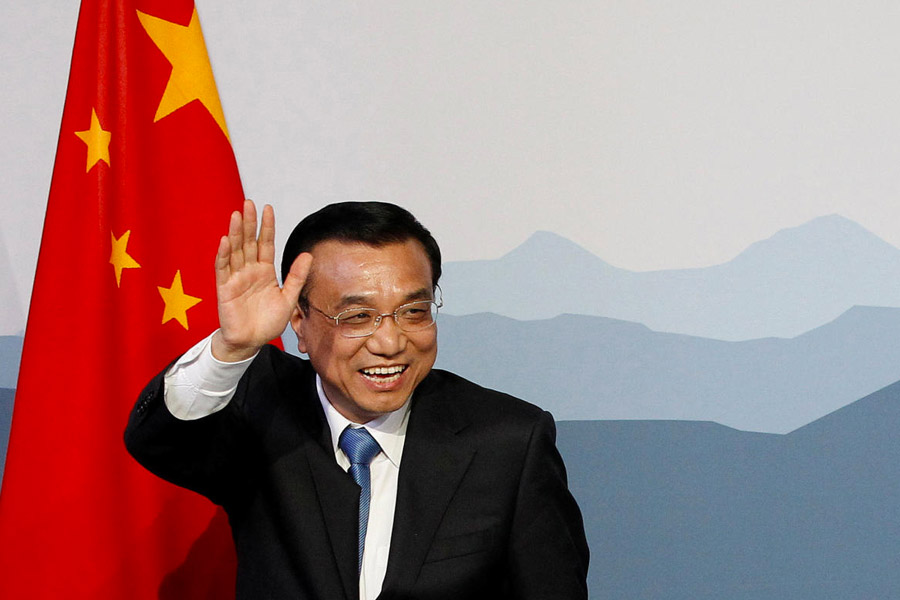China's former Premier Li Keqiang died of a heart attack on Friday, just 10 months after retiring from a decade in office during which his reformist star had dimmed. He was 68.
Once viewed as a top Communist Party leadership contender, Li was sidelined in recent years by President Xi Jinping, who tightened his grip on power and steered the world's second-largest economy in a more statist direction.
The elite economist supported of a more open market economy, advocating for supply-side reforms in an approach dubbed "Likonomics" - which was never fully implemented.
Ultimately, he had to bend to Xi's preference for more state control and his former power base waned in influence as Xi installed his own acolytes to powerful positions.
"Comrade Li Keqiang, while resting in Shanghai in recent days, experienced a sudden heart attack on October 26 and after all-out efforts to revive him failed, died in Shanghai at ten minutes past midnight on October 27," state broadcaster CCTV reported.
Chinese social media experienced an outpouring of grief and shock, with some government websites turning black-and-white in an official sign of mourning. The Weibo microblogging platform turned its "like" button into a "mourn" icon in the shape of a chrysanthemum flower.
Li was premier and head of China's cabinet under Xi for a decade until stepping down from all political positions in March.
Laying a wreath in August 2022 at a statue of Deng Xiaoping - the leader who brought transformational reform to China's economy - Li vowed: "Reform and opening up will not stop. The Yangtze and Yellow River will not reverse course."
Video clips of the speech, which went viral but were later censored from Chinese social media, were widely viewed as a coded criticism of Xi's policies.
Li sparked debate on poverty and income inequality in 2020, saying 600 million people in China earned less than the equivalent of $140 per month.
End of an era
Some Chinese intellectuals and members of the liberal elite expressed shock and dismay on a semi-private WeChat channel at the passing of a beacon of China's liberal economic reform, with some saying it signalled the end of an era.
"Li will probably be remembered as an advocate for the freer market and for the have-nots," said Wen-Ti Sung, a political scientist at Australian National University. "But most of all, he will be remembered for what could have been."
Alfred Wu, associate professor at the Lee Kuan Yew School of Public Policy in Singapore, said, "All these types of people no longer exist anymore in Chinese politics."
Li was less influential than his immediate predecessors as premier, Zhu Rongji and Wen Jiabao, Wu said. "He was sidelined but what more could he have done? It was very hard for him, with the constraints he faced under Xi."
Adam Ni, an independent China political analyst, described Li as "a premier who stood powerless as China took a sharp turn away from reform and opening".
Some social media users mentioned a song called "Sorry it wasn't you", a veiled reference to Xi. The song went viral around the death of former President Jiang Zemin in November last year before being censored.
"Xi will likely respect party tradition and lead public mourning for Li, as he has no reason to anger Li's colleagues and supporters in the party, whose waning political influence is further weakened by his death," said Neil Thomas, fellow for Chinese politics at the Asia Society Policy Institute's Center for China Analysis.
Li was born in Anhui province in eastern China, a poor farming area where his father was an official and where he was sent to toil in the fields during the Cultural Revolution.
While studying law at the prestigious Peking University, Li befriended ardent pro-democracy advocates, some of whom would become outright challengers to party control.
The confident English speaker was immersed in the intellectual and political ferment of the decade of reform under Deng. That period ended in the 1989 pro-democracy Tiananmen Square protests that the military crushed.
After graduation, he joined the Communist Party's Youth League, then a reformist-tinged ladder to higher office.
He rose in the Youth League while completing a master’s degree in law and then an economics doctorate under Professor Li Yining, a well-known advocate of market reforms.
His political experience as a provincial leader in Henan, a poor and restless rural belt of central China, was marred by accusation of cracking down after an AIDS scandal. He also served as party chief of Liaoning, a rustbelt province striving to attract investment and reinvent itself as a modern industrial heartland.
Li’s patron was Hu Jintao, a former president from a political faction loosely based around the Youth League. After Xi took over as party chief in 2012, he took steps to break up the Youth League faction. Li is survived by his wife Cheng Hong, an English professor at the Capital University of Economics and Business, and their daughter.











